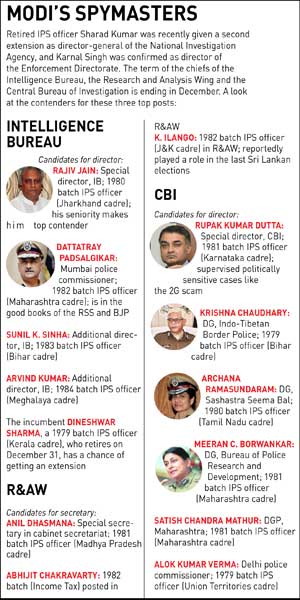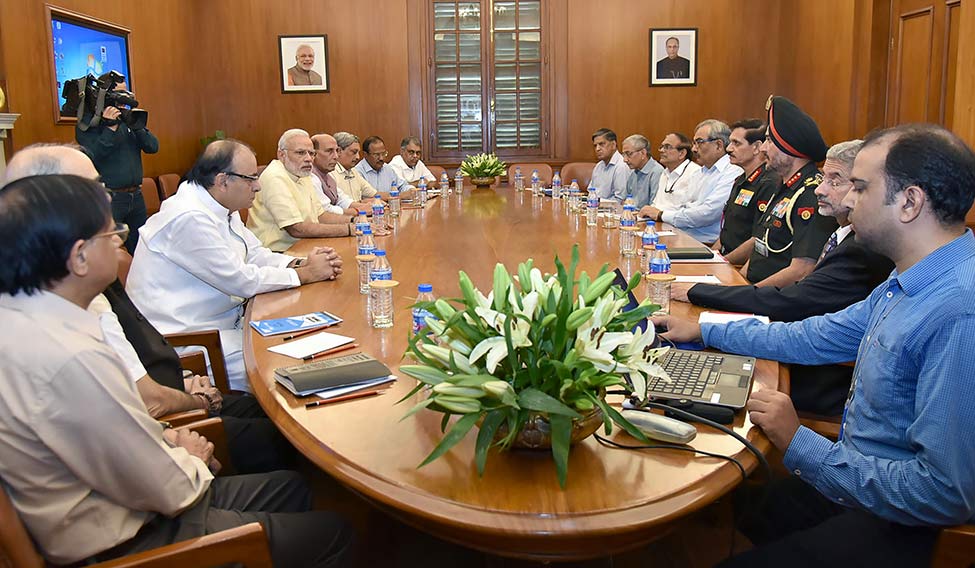Prime Minister Narendra Modi’s spy hunt has begun for two agencies that determine India’s intelligence capabilities. Intelligence Bureau chief Dineshwar Sharma and Research and Analysis Wing secretary Rajinder Khanna are set to hang up their boots on December 31, when their two-year fixed tenure comes to an end. Amid heightened tension with Pakistan, increasing influence of China in the neighbourhood, especially the China-Pakistan Economic Corridor, and Islamic State-inspired terrorists knocking at India’s doorstep, Modi’s new spymasters will steer the country’s strategic and counter-intelligence efforts for the next two years.
Domestically, the government is trying to wipe out corruption, so there is added significance to the next director of the anti-corruption agency, Central Bureau of Investigation. The incumbent director, Anil Kumar Sinha, is set to demit office on December 2.
Rajiv Jain, special director of the IB, has emerged as the frontrunner for the post of its director, and Anil Dhasmana, special secretary in the cabinet secretariat, as secretary of the external spy agency, R&AW. The frontrunner for the post of CBI chief is Rupak Kumar Dutta, who as special director in the CBI is looking after critical charges like bank securities and frauds, and has supervised politically sensitive cases like the 2G spectrum scam.
A charming personality and highly popular in his network, Jain has three decades of experience in the IB. A 1980 batch Indian Police Service officer of Jharkhand cadre, Jain is the only officer of his seniority and experience (there is no other officer serving in IB who belongs to 1980 and 1981 batch), which makes him the top contender. He is a specialist in cyber and economic matters, and has served as head of State Intelligence Bureau in Delhi and joint director of the IB in Ahmedabad when Modi was chief minister.
Seniority counts when it comes to succession battles in top jobs like these. But the government takes the final call, sometimes throwing up disappointments, at other times surprises.
There is a chance that Sharma might get an extension. It could spell disappointment for Jain who retires in 2017. An expert on Kashmir and terrorism, Sharma is close to National Security Adviser Ajit Doval. The proximity, in fact, worked to his advantage when he was picked over his senior in the 1979 IPS batch, Ashok Prasad of Andhra Pradesh, as IB chief in 2014. Both Sharma and Doval belong to the Kerala cadre. If not an extension, Sharma is likely to be given another assignment.

The intelligence community is divided over whether chiefs of crucial Central agencies should be granted an extension. A section believes that the Modi government has traditionally been against granting extensions for senior posts, but there have been exceptions, such as the recent re-appointment of the National Investigation Agency chief. Retired IPS officer Sharad Kumar has been given a second extension to serve as the director-general of the NIA for another year. Incidentally, Kumar and Sharma are close friends.
Unlike the mystery that shrouds the selection of the next IB chief, R&AW chief’s appointment is likely to be a straight one. Anil Dhasmana, a 1981 batch Madhya Pradesh cadre officer, is tipped to succeed Rajinder Khanna. Owing to his foreign postings spanning 30 years, Khanna has built an enviable global spy network, which has been of use to New Delhi, particularly in the past two years. Dhasmana, on the other hand, has been giving the jitters to Pakistan sitting in New Delhi.
The Pakistan media has described Dhasmana as the spy who is trying to sabotage the Pakistan-China Economic Corridor. He was last seen attending the post-Uri covert strike meeting called by Modi and attended by the security top brass.
Unlike the IB and R&AW, where appointments are made directly by the government, the CBI chief is selected on the basis of recommendations of the selection committee comprising the prime minister, the leader of opposition and the Chief Justice of India or a Supreme Court judge nominated by him.
The Ministry of Home Affairs has sent a list of 39 eligible IPS officers belonging to the 1979-82 batch to the Department of Personnel and Training. Alongside top contender Rupak Kumar Dutta, three other candidates—Indo Tibetan Border Police chief Krishna Choudhary, Sashastra Sena Bal chief Archana Ramasundaram and Bureau of Police Research and Development chief Meeran Borwankar—are in the race for the top job.
Dhasmana’s appointment will be watched closely by China, Pakistan and friendly nations like Sri Lanka, Nepal and Myanmar. But, for the new R&AW chief, the focus areas would be countries like the US and France, where India has strategic interests. If Modi wants to upgrade relations with Africa, the Middle East and South East Asia with its Look East policy, the R&AW will need to play a bigger role.
The CPEC corridor and China’s weapons supply relationship with Pakistan require deeper analysis in the coming years, said an intelligence officer.
Another priority for the R&AW chief would be to gain access to uncharted territories and understand the threats and impending challenges linked to them. The agency is heavily dependent on communication interpretation for its counter-intelligence operations. However, the advancements in technology and encryption could prove to be a challenge. “While we will be able to catch the exchanges, we will not be able to decipher it. Today, 60 per cent of all encrypted material can be deciphered by the R&AW,” said a spy.
Another pressing issue is the need to simplify the formal recruitment procedures so that the right people with the requisite expertise in a particular field could be hired. “Recently, the R&AW needed experts to decipher a lot of information, but with official procedures proving a hurdle, we hired the experts on a contract basis,” said an intelligence official.
Then there are common concerns like the need for both the R&AW and the IB to focus on improving coordination and “operationalising intelligence for internal security”. The new chiefs will have to brainstorm over minimising turf battles and creating mechanisms for free flow of intelligence so that it does not get withheld or lost because of lack of coordination.
The Intelligence Bureau will also have to give regular training for its sleuths. “Though we have enough field agents, to have them completely updated is a tough task these days. The problem is that after the field agent is recruited, there is no refresher training. This is something that needs to be scaled up majorly,” pointed out an IB sleuth.
The IB is also in dire need to build its next generation of artificial intelligence capabilities. “The technology is available and so are funds. But how do you create experts in the field of artificial intelligence who can be ahead of the curve? The IB is doing big data analysis,” said an officer.
The intelligence chiefs have to marry real-time intelligence with artificial intelligence. The success of any terror operation depends on cracking the communication system used by the terrorists. A latest case in point is the cross-border commando strike in Pakistan-occupied Kashmir for which Indian intelligence agencies used image processing to identify the terror camps.








